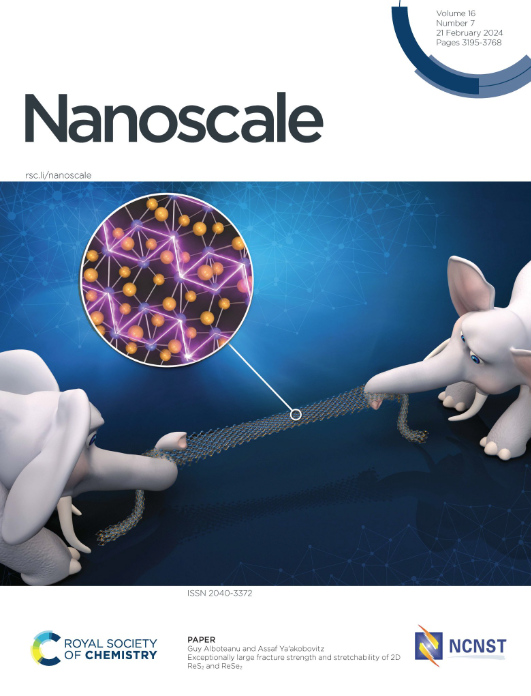乙烯热分解对碳纳米管生长的影响:来自双区反应器研究的见解
IF 5.1
3区 材料科学
Q1 CHEMISTRY, MULTIDISCIPLINARY
引用次数: 0
摘要
碳前驱体的气相分解是碳纳米管(CNTs)化学气相沉积催化生长过程中一个关键但尚未完全了解的步骤。在这里,我们提出了一个系统的研究如何热分解C2H4影响碳纳米管生长。采用定制设计的两区反应器,具有独立控制的预热(分解)和碳纳米管生长区,我们将气相分解的影响与生长温度解耦。首先采用贝叶斯优化方法建立了碳纳米管生长区温度(Tg)固定在700 °C的标准合成条件。然后在500、600、700、800和900 ℃的预热区温度(Tp)下合成CNTs,同时在标准条件下将Tg保持在700℃。碳产率和IG/ID在500、600和700 °C时保持稳定,但在800和900 °C时变化显著。为了阐明这些变化,我们使用微气相色谱分析了不同温度下的气相组成。在700°C以上,观察到气相组成的显著变化,与碳收率和结晶度的变化相关。基于这些结果,我们提出了气体化学差异导致碳产率和IG/ID比变化的机制。该研究对气相分解在碳纳米管生长中的作用提供了有价值的见解,并强调了调节气相化学以控制碳纳米管生长的潜力。本文章由计算机程序翻译,如有差异,请以英文原文为准。
Influence of Ethylene Thermal Decomposition on Carbon Nanotube Growth: Insights from a Two-Zone Reactor Study
Gas-phase decomposition of carbon precursor is a critical yet not fully understood step in the catalytic chemical vapor deposition growth of carbon nanotubes (CNTs). Here, we present a systematic investigation of how the thermal decomposition of C2H4 influences CNT growth. Using a custom-designed two-zone reactor with independently controlled preheating (decomposition) and CNT growth zones, we decoupled the effects of gas-phase decomposition from the growth temperature. A standard synthesis condition was first established using Bayesian Optimization, with the CNT growth zone temperature (Tg) fixed at 700 °C. CNTs were then synthesized at preheating zone temperature (Tp) of 500, 600, 700, 800, and 900 °C, while maintaining Tg at 700 °C under the standard condition. Carbon yield and IG/ID remained stable at 500, 600, and 700 °C but showed significant changes at 800 and 900 °C. To elucidate these variations, we analyzed the gas-phase composition at various temperatures using micro-GC. Significant change in the gas-phase composition was observed at above 700 °C, correlating with changes in carbon yield and crystallinity. Based on these results, we propose a mechanism by which differences in gas chemistry lead to changes in the carbon yield and the IG/ID ratio. This study provides valuable insight into the role of gas-phase decomposition in CNT growth and highlights the potential of tuning gas-phase chemistry for controlled growth of CNTs.
求助全文
通过发布文献求助,成功后即可免费获取论文全文。
去求助
来源期刊

Nanoscale
CHEMISTRY, MULTIDISCIPLINARY-NANOSCIENCE & NANOTECHNOLOGY
CiteScore
12.10
自引率
3.00%
发文量
1628
审稿时长
1.6 months
期刊介绍:
Nanoscale is a high-impact international journal, publishing high-quality research across nanoscience and nanotechnology. Nanoscale publishes a full mix of research articles on experimental and theoretical work, including reviews, communications, and full papers.Highly interdisciplinary, this journal appeals to scientists, researchers and professionals interested in nanoscience and nanotechnology, quantum materials and quantum technology, including the areas of physics, chemistry, biology, medicine, materials, energy/environment, information technology, detection science, healthcare and drug discovery, and electronics.
 求助内容:
求助内容: 应助结果提醒方式:
应助结果提醒方式:


